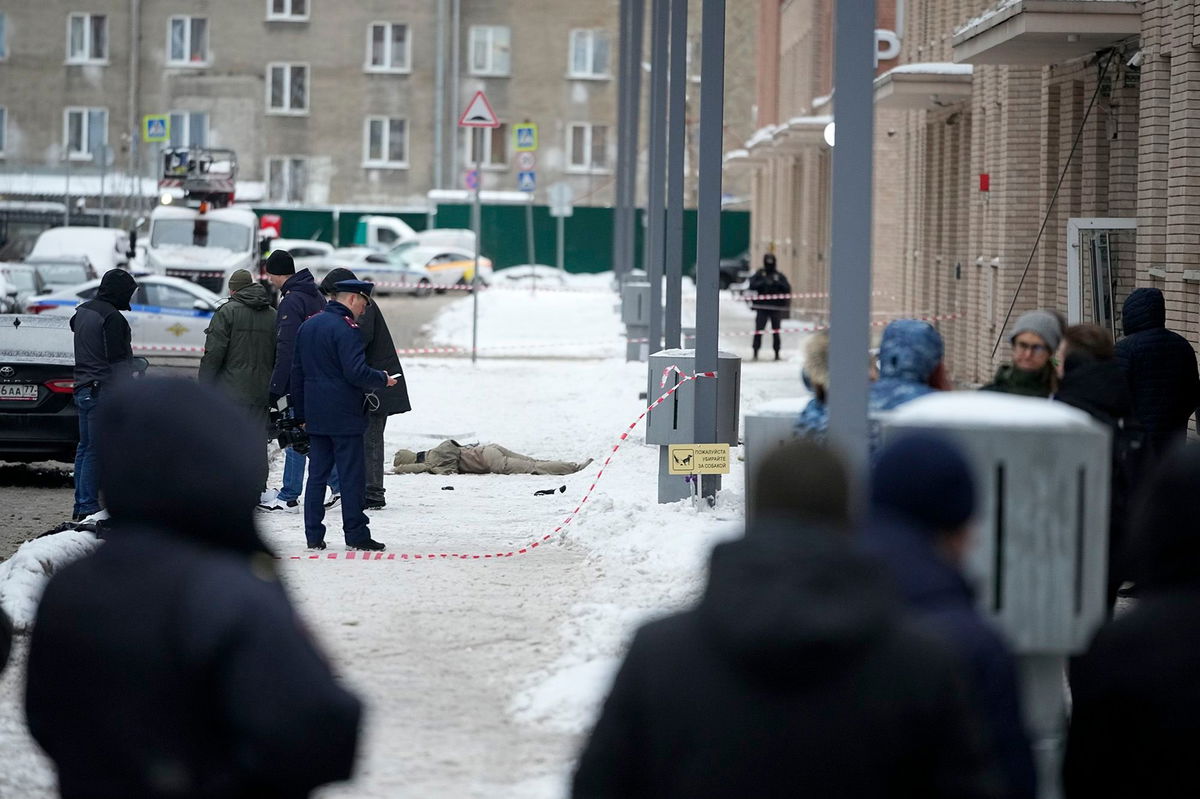Russia detains Uzbek national over bomb assassination of senior general

Investigators work at the place where Lt. General Igor Kirillov
(CNN) — Russia said on Wednesday it had detained a man from Uzbekistan over the killing of a senior Russian general and his assistant in Moscow a day earlier.
Lt. Gen. Igor Kirillov, who headed Russia’s radiological, biological and chemical protection forces, was killed by a remotely detonated bomb planted in an electric scooter outside his apartment building.
The blast came a day after Ukrainian prosecutors indicted Kirillov in absentia for Russia’s use of banned chemical weapons during its invasion of Ukraine. A source with knowledge of the operation later told CNN that Ukraine’s security service, the SBU, was behind the attack.
Russia’s Investigative Committee said the 29-year-old Uzbek suspect was recruited by the SBU and acting on its instructions. It claimed that the suspect had been offered a reward of $100,000 in cash and the chance to flee and live in a European country.
“The detainee received a homemade explosive device and placed it on an electric scooter which he parked at the entrance to the residential building where Igor Kirillov lived,” the committee said.
The suspect had rented a car and fitted it with a surveillance camera to monitor Kirillov’s residence, it added. The footage was monitored by the attack’s organizers in Ukraine’s eastern city of Dnipro, it said, who remotely detonated the bomb when they saw Kirillov and his assistant leave the building on Ryazansky Street early Tuesday morning.
Kirillov, who was 54, was the most senior military official known to be killed since Russia launched its full-scale invasion of Ukraine in February 2022. A source in Ukraine’s SBU told CNN that Kirillov’s “inglorious end awaits all those who kill Ukrainians” and that “retribution for war crimes is inevitable.”
Kirillov’s assassination struck not only at the core of Russia’s military, but close to the heart of the nation’s capital, just 7 kilometers (4 miles) from the Kremlin. His death marked the fourth killing of key military figures on Russian soil in the last two months alone.
Although Kirillov’s death will likely not significantly hamper Russia’s war effort, it is a measure of the urgency with which Ukraine is trying to wrest pack the initiative in the nearly three-year-old war by any means possible, as the clock ticks down to Donald Trump’s return to the White House and Russia continues to advance on the eastern front.
Ukraine’s killing of Kirillov will likely have a chilling effect among Russia’s elite, according to Nigel Gould-Davies, senior fellow for Russia and Eurasia at the International Institute for Strategic Studies.
“What’s most significant about this was that it takes place at an unprecedented level of seniority,” Gould-Davies told CNN. “This will deeply disconcert other senior elite, including military figures, that they can, in the capital itself, be killed like this.”
Russian state media identified the suspect as Akhmad Kurbanov and published a video of him – recorded by Russia’s spy agency, the FSB – seeming to confess to planting the bomb that killed Kirillov. It was not clear whether the individual was speaking under duress.
The Kremlin has published similar videos before. Following the attack in March on Crocus City Hall in Moscow, when gunmen stormed a concert venue in Russia’s worst terror attack in decades, Russian authorities published videos of suspects – also from Central Asia – being hunted down and beaten by security forces. They later appeared in court displaying injuries to their faces and bodies.
The suspect’s Uzbek citizenship could spark a renewed backlash against Central Asian immigrants in Russia, as seen after the Crocus City Hall attack carried out by men from Tajikistan. Russia relies heavily on Central Asian immigrants to plug gaps in its workforce, strained by the war in Ukraine.
In a press briefing Wednesday, Kremlin spokesperson Dmitry Peskov said Kirillov’s assassination shows Ukraine “does not shy away from using terrorist methods.”
A source in Ukraine’s SBU told CNN on Tuesday that Kirillov “was a war criminal and an absolutely legitimate target, as he gave orders to use banned chemical substances against the Ukrainian military.”
A day before his killing, the SBU said that, on Kirillov’s orders, Russia had used more than 4,800 cases of chemical munitions since the war began. CNN has previously reported on Russia’s use of tear gas as a weapon in Ukraine.
Before his death, the United States had sanctioned Kirillov’s government entity for its alleged use of the chemical weapon chloropicrin against troops in Ukraine.
Chloropicrin – which affects the eyes, skin, throat and lungs – was manufactured for use as a tear gas during the trench warfare of World War I. It was banned in 1993 under the Chemical Weapons Convention (CWC), to which Russia is a signatory.
The United Kingdom also sanctioned Kirillov in October for the “deployment of barbaric chemical weapons” in Ukraine.
The-CNN-Wire
™ & © 2024 Cable News Network, Inc., a Warner Bros. Discovery Company. All rights reserved.